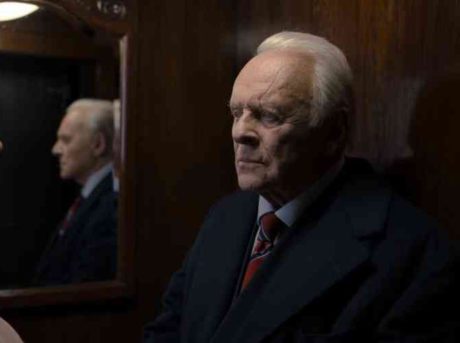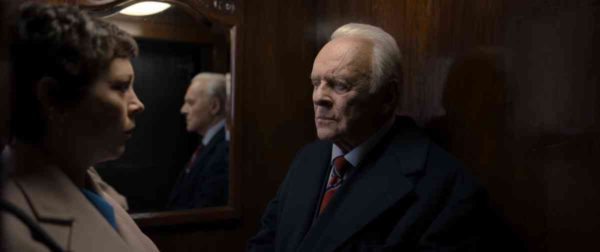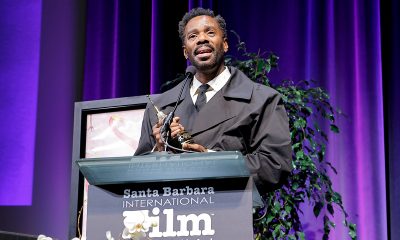Arts & Entertainment
In diverse slate of winners, Oscar is the biggest loser


Best Actor winner Anthony Hopkins (center) with co-star Olivia Colman in “The Father” (image courtesy Sony Pictures Classics)
We knew the Academy Awards were going to be different this year.
Forced by Covid to reimagine its traditional presentation format, the movie industry’s most prestigious awards show convened not at Hollywood’s Dolby Theatre — at least, not for most of it — and opted instead to broadcast the ceremony from the relative intimacy of Los Angeles’ historic Union Station, where a small audience of nominees, presenters and guests gathered under “live set” safety protocols while other participants connected from various remote hook-ups across the world. Instead of auditorium seating, tables; instead of an orchestra, Questlove. In addition, show producers Steven Soderbergh, Jesse Collins, and Stacy Sher chose to shoot the event cinematically, employing the tricks and techniques of film to transform the evening from the stodgy affair so many of us love to hate into something resembling a movie. As promised during the week ahead of the broadcast, the show was going to tell a “story.”
It was a gamble that didn’t pay off.
Things started out promisingly enough, it must be said, with an opening tracking shot that followed host Regina King from the bright L.A. sunshine into the cool darkness of Union Station. The motion, the music, and most of all King’s commanding presence, gave us the sense that something big was about to happen. Then, early in her opening comments to the audience, King brought substance to the weight by commenting that “if things had gone differently in Minneapolis this week, I might’ve traded in my heels for marching boots” — reminding us (as if it were needed) of the national focus on Black justice that hung alongside Oscar’s long-lamented struggle with diversity like a shadow over the evening. The central theme of this Oscar “movie,” it seemed, had been firmly established.
For awhile, it seemed to be working. The evening’s first winners were Emerald Fennell for Best Original Screenplay, for “Promising Young Woman,” and Florian Zeller for Best Adapted Screenplay, for “The Father,” appearing to set a tone for the ceremony in which recognition would be spread around to all — something very much in tune with the presumed subplot of the “story” we were being told, in which Oscar would redeem itself from the #OscarsSoWhite associations of its past and prove itself to be a champion for fair and equal diversity, after all.
Soon after, Daniel Kaluuya took the award for Best Supporting Actor – no surprise there, as his performance as slain Black Panther leader Fred Hampton in “Judas and the Black Messiah” had won the equivalent prize from every other major film awards so far — firmly establishing the “redemption” theme by celebrating the powerful work of a Black actor in a true-life story that addressed the corruption and tragedy of systemic racism in America. A pair of awards for “Ma Rainey’s Black Bottom” (Best Makeup and Styling, Best Costume Design), as well as a win for the police-violence-themed “Two Distant Strangers” as Best Live-Action Short, reinforced it even further. Better still, a shout-out to trans acceptance from “Ma Rainey” stylist Mia Neal in her speech, and a plea from “Strangers” writer/director Travon Free for audiences not to be “indifferent to our pain” in his, lent a powerful sense of earnestness that made the whole thing feel authentic. Maybe this year, Oscar was finally getting it right.
Unfortunately, the Oscar “story,” in its effort to be inclusive, allowed all the winners to talk until they were done. In other words, Questlove did not start playing anyone off when they had used up their time, and the ambitious “movie” of the Oscars soon began lose any momentum it had built. This is not to say that the winners don’t deserve their time in the spotlight, or that some of the things that were said were not worthy of being heard; but anyone in show business should know the importance of keeping your audience interested, and the Academy Awards have such a long history of running ponderously overtime that it seems some kind of middle ground might have been reached.
There were other familiar complaints, too. The annual “in memoriam” segment inevitably left out some important names (Ann Reinking, Jessica Walter, “Glee” star Naya Rivera, and former Oscar nominee songwriter Adam Schlesinger, to name just a few), and there was an awkward segment in which Questlove played “Oscar trivia” with audience members, who were asked to identify movie songs that did NOT win the Academy Award. The latter situation was almost saved by nominee Glenn Close, who did an “impromptu” rendition of “Da Butt” that was as goofily charming as it was obviously pre-planned.
As the show wore on, the cinematic conceit chosen to revitalize the proceedings became mostly irrelevant in the face of Oscar’s usual baggage. Further, the absence of any performances of the year’s nominated songs, typically a favorite feature of fans at home, meant there was little respite from the dullness, which was made all the more apparent by the increasingly bored faces of the onscreen audience. The omission may have been due to the difficult logistics of additional Covid protocols, but surely pre-taped performances might have helped to perk things up. For the record, Best Original Song went to “Fight For You,” from “Judas and the Black Messiah.”
Along the way, there were noteworthy wins. The much-loved Pixar-Disney film “Soul” took the award for Best Animated Feature, as well as winning Best Original Score for composers Trent Reznor, Atticus Ross, and Jon Batiste; the virally popular “My Octopus Teacher” won for Best Documentary Feature; David Fincher’s black-and-white old-Hollywood homage “Mank” took the prizes for Best Production Design and Best Cinematography, continuing the trend of spreading out the wealth among the front-running contenders; in presenting Best Film Editing to “The Sound of Metal,” still-hunky Hollywood curmudgeon Harrison Ford gave an amusing nod to “Blade Runner,” the revered 1982 sci-fi film in which he starred, by reading the scathingly negative studio notes from a pre-release screening; and Best Supporting Actress went to veteran performer Yuh-Jung Youn for her work in “Minari,” making her only the second woman of Asian heritage to win the award (the first was Miyoshi Umeki for 1957’s “Sayanora”) — and making Close, who was nominated for her role in “Hillbilly Elegy,” tied with Peter O’Toole as the actor with the most nods without a single win.
By the time we reached the presentation of the four top prizes, there was little left of whatever enthusiasm had been drummed up by the opening segment of the show. Chloe Zhao’s expected win as Best Director, for “Nomadland,” making her the first Asian-American woman (and only the second woman, period) to receive the award, was an appreciated high point for her enthusiastic gratitude alone, but at this point, things had become pretty much business as usual, despite the grand designs and cinematic flourishes of the producers.
Then, the big twist came. Best Picture, always the final award of the evening, was being announced before the Lead Acting awards. What was happening? Was the Oscar “movie” about to give us a surprise ending?
The winner, “Nomadland,” had been favored, and star Frances McDormand helped to make the moment a highlight with a “wolf” howl (dedicated to sound mixer Michael “Wolf” Snyder, who passed away last month) when she joined the film’s other producers at the podium, but surely neither of those things warranted switching the order. Perhaps a clue to what was really happening could be found in the choice of presenter – Hollywood icon Rita Moreno, still fabulous at 89, whose Best Supporting Actress win for 1961’s “West Side Story” happened to have made her the first Hispanic woman to win an Oscar. Was this reminder of diversity from the Academy’s past a sign that the “redemption” theme was about to pay off?
It suddenly became obvious. The Oscar “movie” was leading up to an emotional finale, a big and uplifting triumph that would not only be a celebration of diversity, but a tribute to a gifted young man whose talents had been taken away from us too soon. The story of Oscar’s redemption would culminate in the posthumous awarding of the Best Actor prize to Chadwick Boseman, whose nominated performance in “Ma Rainey’s Black Bottom” was the last work he completed before losing his private battle with colon cancer and passing away at 43 last August. That would definitely be a “wow” finish.
Best Actress came first, accompanied by some suspense due to being one of the few categories without a clear front-runner. McDormand took the statue for “Nomadland,” joining a small handful of other performers as a three-time-winner and preventing “Ma Rainey” star Viola Davis from becoming the first Black actress to win twice. Her speech was refreshingly short and humble, a tribute to the joy of “the work” which included a quote from Shakespeare’s “Macbeth” (“My voice is in my sword”) – a play considered by actors worldwide to be “cursed,” which in retrospect casts an interesting light on what happened next.
To present the final award, last year’s Best Actor winner Joaquin Phoenix (looking exceptionally uncomfortable) came to the mike and, after a feeble joke about his reputation for method acting, read off the five nominees before opening the envelope to bring about the now much-anticipated denouement.
“And the Oscar goes to… Anthony Hopkins, ‘The Father.’”
It wasn’t quite “fade to black, roll credits” after that, but it might as well have been.
There was no uplifting finale, no redemption of the Academy as a reward for its show of diversity. There was only another in a long-running series of gaffes (remember the “La La Land” vs. “Moonlight” debacle from just a few years back?) that have made the Oscar show’s tendency to mess things up a running joke.
This one, however, was possibly the worst. In an arrogant attempt to shape a narrative out of real life events that hadn’t even happened yet, the Academy seems to have chosen to manipulate its audience into an emotional reaction — one that would have bolstered its own reputation and perhaps made up for some of its former perceived missteps — while exhibiting a cynical overconfidence in its own ability to predict the sentiments of its voters. As a result, its “wow” finish turned into an abrupt and uncomfortable faux pas, diminishing both Hopkins’ victory for a career-topping performance (which, at 83, makes him the oldest acting winner in Oscar history) and Boseman’s searingly powerful work by obscuring their accomplishments behind a colossal f*ck-up born of its own hubris.
It’s worth noting that a plan was (reportedly) in place in the supposedly “unlikely” event that Hopkins would win, in which “Father” co-star Colman – known for her disarming grace and humor in awards situations – would have accepted the award in his absence. As reported by The Guardian, Phoenix forgot to call her to the stage, resulting in the dull thud that was the end of the 93rd Academy Awards. Regardless, the Academy has only itself to blame. In its eagerness to tell the story it wanted to tell about itself, it appears to have forgotten that you have to know the ending first.
Ironically, when removed from all the drama, the list of winners does represent one of the most diverse and inclusive slates in Oscar history. It’s not enough, but it’s a start.
On that note, as a final observation, the LGBTQ community, despite recent strides in being acknowledged by Oscar, went largely unacknowledged at this year’s ceremony, with queer front-runners like “Two of Us” (a French contender for Best International Feature) and David France’s devastating “Welcome to Chechnya” (shortlisted for Best Documentary Feature) having been shut out of the nominations and no significant queer content among most of the nominated films. Apart from Neal’s aforementioned invocation of trans acceptance as part of a possible future in which the recognition of all women for their achievements would be “normal,” the only other time we came up was during Tyler Perry’s acceptance speech for the Jean Hersholt Humanitarian Award.
Perry, whose highly popular films are frequently criticized for embracing borderline homophobic and transphobic humor and perpetuating problematic tropes about gender and sexuality, gave a speech calling for people to “refuse to hate” anyone “because they are Mexican, or because they are Black or White, or LBGTQ” or “because they are a police officer” or “because they are Asian.” Apart from the conflation of being a police officer (a choice) with being an LGBTQ person or a person of color (not a choice), the fact that he mixed up the “B” and the “G” is a clear indicator that, while he may refuse to hate us, he’s not exactly a committed ally, either.
If the LGBTQ angle seems like a footnote to the story, that’s because it is. Once more, the queer community is left feeling like an uninvited guest by the Academy.
If Oscar wants its story to be about diversity, it’s clear that next year’s “story” needs some better writers.
Television
ICYMI: ‘Overcompensating’ a surprisingly sweet queer treat
A sweet, savvy show about breaking free to embrace your true self

Pride month 2025 is now behind us, and while it’s safe to say that this year’s celebrations had a darker edge than usual, it’s also true that they came with a particularly rich bounty of new queer movies and shows to entertain us – so many, in fact, that even if we are facing a lull until the fall another harvest of fresh content, there are still plenty of titles – which, for whatever reason, were off your radar – for you to catch up on in the meantime.
One of the most notable of these – the bingeworthy series “Overcompensating” (now streaming on Amazon Prime) – will most definitely have been ON the radar for the plentiful fans of creator and star Benito Skinner, the actor/comedian who rose to viral fame through his content on platforms like Instagram, YouTube, and TikTok. For anyone else, it might have easily slipped through the cracks.
Created and written by Skinner as a loosely autobiographical “college comedy,” it aims for the kind of raucous, explicitly sexed-up tone one expects from the genre as it centers on Benny (Skinner), newly arrived as a freshman at prestigious Yates University. A former football jock and “golden boy” at his midwestern high school, he’s the picture of idealized youthful masculinity; he’s also deep in the closet, struggling to keep his sexuality hidden and maintain his macho front under the intense scrutiny of the college’s social scene – and under the resentful eye of his older sister Grace (Mary Beth Barone), who has already secured her own place at the top of the pecking order.
In the first episode, Benny’s difficulties are eased when he meets Carmen (Wally Baram), another freshman trying to navigate the politics of college life; a gamer from a home marred by tragedy, she’s an outsider who feels like she’s putting on an act, too, and they click – giving him the convenient “cover” of female companionship while providing them both with much-needed support and encouragement. He’s also befriended by a handsome film major from England (Rish Shah), who has already caught his eye, stirring other kinds of feelings and possibly even reciprocating them. Meanwhile, he’s being courted by the school’s “exclusive secret society” – headed by his sister’s aggressively “alpha” boyfriend Pete (Adam DiMarco) – and trying to stay interested in his studies, despite a growing realization that a career in business doesn’t actually appeal to him all that much.
That’s a lot to juggle for anybody, even an overachiever like Benny – whose “lucky” life so far has largely been the result of playing a role he is finding harder and harder to maintain. As the series goes on through its eight-episode arc, it becomes clear that he’s not the only one who is “keeping up appearances,” and he, along with the other confused and damaged young people in his orbit, begins the painful (but often hilarious) process of evolution that is required in order to become truly oneself.
Directed toward appealing to a younger demographic, “Overcompensating” is the kind of show that requires a few episodes worth of invested time to make an impression that feels like substance. Full of the bawdy farcical antics that go hand in hand with stories about hormonally charged college kids, it’s not above leaning into the formulas and tropes that have always driven these kinds of comedies. At first, while its broadly comedic strokes and frequently explicit sexual hijinks might elicit plenty of chuckles, the show might easily feel tiresome for more mature audiences; there’s a nostalgic fun to it, made even more appealing, somehow, by the “political incorrectness” of its frequently sexist and homophobic humor, but for a while things may feel like an unnecessary attempt to reinvent “Animal House” for the Gen Z crowd.
By the time the season reaches its halfway point, however, things have started to get real. The antics of these horny almost-adults take on a more pointed absurdity, informed by the increasingly tangled web of defensive deceit they weave among themselves – and, as things draw toward a cliffhanger climax, the consequences of maintaining it – until it achieves a sense of empathy toward them all. There’s a wisdom that smacks of lived authenticity underlying the whole affair, transforming it from the “sexploitative” teen comedy of its surface into something deeper. To be sure, things stay expectedly wacky, and the soap-operatic melodrama of its twists and reversals continue to maintain the show’s “mature YA” appeal; but beneath those trappings, by the end of the season a truer identity has begun to emerge, just as its characters have begun to find their own levels of self-actualization for themselves.
As creator, primary writer, and star, it’s obviously Skinner who deserves much of the credit. While it might be tempting, early on, to dismiss the show as an “ego project,” the internet-spawned sensation proves his talents quickly enough to get past such judgy suspicions, delivering a pitch-perfect blend of sauciness and sensitivity that extends its appeal toward both ends of the taste spectrum; just as crucially, he brings the same aforementioned “lived authenticity” to his winning performance – after all, he’s essentially playing himself in a fictionalized version of his own life – while also making sure that equal time (and compassion) is afforded all the other characters around him, each of whom are pushing at the boundaries of their own respective “closets,” too. It’s unavoidable to notice that – like most of his co-stars – he’s plainly a decade too old to be playing a college student; but by the time we reach that crucial halfway turning point, we’ve become too engaged by him to care.
The show is full of excellent performances, in fact. Relative newcomers Baram and Barone offer layers of complex nuance, while the more familiar DiMarco (“White Lotus”) is close to heartbreaking as the toxic BMOC clinging to the illusion of power as his life begins unraveling around him. Other standouts include the mononymic actress Holmes as Carmen’s “wild child” roommate, solidly likable turns as Benny’s parents from mature veterans Connie Britten and Kyle MacLachlan (whose presence, along with stylish elements in several key scenes, hints at an homage-ish nod to the late David Lynch), and podcaster Owen Thiele as an openly gay fellow student who has Benny “clocked” from the moment they meet. Finally, Lukas Gage makes a deep impression as a former high school teammate at the heart of Benny’s most haunting memory.
There’s no official word yet on whether “Overcompensating” will be renewed for a second season, despite the multiple loose ends left dangling at the end of its first; it has proven to be popular, and Skinner’s large fanbase makes it likely that the story will continue. Even if it doesn’t, the place of uncertainty in which it has left its characters rings true enough to serve as a satisfying endpoint.
As for us, we hope that won’t happen. For all its sophomoric humor, generic plot twists, and purposefully gratuitous sexual titillation, it’s one of the sweetest, kindest, and most savvy shows we’ve seen about breaking free from conformity to embrace your true self – and that’s a message that applies whether you’re queer, straight, or anywhere in between.
Photos
PHOTOS: Independence Day Weekend in Rehoboth
Wicked Green Pool Party, fireworks among festivities

Vacationers and residents alike enjoyed Independence Day Weekend activities in Rehoboth Beach, Del. The Wicked Green Pool Party drew hundreds to the CAMP Rehoboth fundraiser on Saturday. That evening, revelers went to the rooftops to watch the fireworks display.
(Washington Blade photos by Daniel Truitt)













Music & Concerts
Red, White, and Beyoncé: Queen Bey takes Cowboy Carter to D.C. for the Fourth of July
The legendary music icon performed on July 4 and 7 to a nearly sold-out Northwest Stadium.

Just in time for Independence Day, Beyoncé lit up Landover’s Commanders Field (formerly FedEx Field) with fireworks and fiery patriotism, bringing her deeply moving and genre-defying “Cowboy Carter” tour to the Washington, D.C. area.
The tour, which takes the global icon across nine cities in support of her chart-topping and Grammy-winning country album “Cowboy Carter,” landed in Prince George’s County, Maryland, over the Fourth of July weekend. From the moment Beyoncé stepped on stage, it was clear this was more than just a concert — it was a reclamation.
Drawing from classic Americana, sharp political commentary, and a reimagined vision of country music, the show served as a powerful reminder of how Black Americans — especially Black women — have long been overlooked in spaces they helped create. “Cowboy Carter” released in March 2024, is the second act in Beyoncé’s genre-traversing trilogy. With it, she became the first Black woman to win a Grammy for Best Country Album and also took home the coveted Album of the Year.
The record examines the Black American experience through the lens of country music, grappling with the tension between the mythology of the American Dream and the lived realities of those historically excluded from it. That theme comes alive in the show’s opening number, “American Requiem,” where Beyoncé sings:
“Said I wouldn’t saddle up, but
If that ain’t country, tell me, what is?
Plant my bare feet on solid ground for years
They don’t, don’t know how hard I had to fight for this
When I sing my song…”
Throughout the performance, Beyoncé incorporated arresting visuals: Black cowboys on horseback, vintage American iconography, and Fox News clips criticizing her genre shift — all woven together with voiceovers from country legends like Dolly Parton and Willie Nelson. The result was a multimedia masterclass in storytelling and subversion.
The “Cowboy Carter” tour has been a social media sensation for weeks, with fans scrambling for tickets, curating elaborate “cowboy couture” outfits, and tailgating under the summer sun. At Commanders Field, thousands waited in long lines for exclusive merch and even longer ones to enter the stadium — a pilgrimage that, for many, felt more like attending church than a concert.
One group out in full force for the concert was Black queer men — some rocking “denim on denim on denim on denim,” while others opted for more polished Cowboy Couture looks. The celebration of Black identity within Americana was ever-present, making the concert feel like the world’s biggest gay country-western club.
A standout moment of the night was the appearance of Beyoncé’s 13-year-old daughter, Blue Ivy Carter. Commanding the stage with poise and power, she matched the intensity and choreography of her mother and the professional dancers — a remarkable feat for someone her age and a clear sign that the Carter legacy continues to shine.
It’s been nearly two decades since Beyoncé and Destiny’s Child parted ways, and since then, she’s more than lived up to her title as the voice of a generation. With “Cowboy Carter,” she’s not just making music — she’s rewriting history and reclaiming the space Black artists have always deserved in the country canon.
-

 Federal Government2 days ago
Federal Government2 days agoTreasury Department has a gay secretary but LGBTQ staff are under siege
-

 Virginia3 days ago
Virginia3 days agoDefying trends, new LGBTQ center opens in rural Winchester, Va.
-

 District of Columbia2 days ago
District of Columbia2 days agoGay GOP group hosts Ernst, 3 House members — all of whom oppose Equality Act
-

 Opinions4 days ago
Opinions4 days agoUSAID’s demise: America’s global betrayal of trust with LGBTQ people












